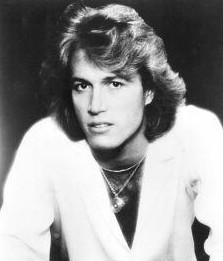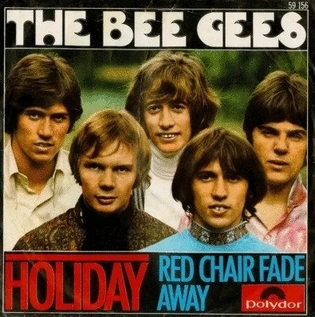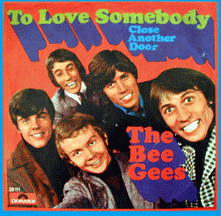
The Bee Gees were a musical group formed in 1958 by brothers Barry, Robin, and Maurice Gibb. The trio were especially successful in popular music in the late 1960s and early 1970s, and later as prominent performers in the disco music era in the mid-to-late 1970s.

Robin Hugh Gibb was a British singer and songwriter. He gained worldwide fame as a member of the Bee Gees with elder brother Barry and twin brother Maurice. Robin Gibb also had his own successful solo career. Their youngest brother Andy was also a singer.

Maurice Ernest Gibb was a British musician and songwriter. He achieved worldwide fame as a member of the pop group Bee Gees. Although his elder brother Barry Gibb and twin brother Robin Gibb were the group's main lead singers, most of their albums included at least one or two songs featuring Maurice's lead vocals, including "Lay It on Me", "Country Woman" and "On Time". The Bee Gees are one of the most successful pop-rock groups of all time.

Sir Barry Alan Crompton Gibb is a British musician, singer, songwriter and record producer. Along with his younger twin brothers, Robin and Maurice, he rose to worldwide fame as a member of the Bee Gees, one of the most commercially successful groups in the history of popular music. Gibb is well known for his wide vocal range including a far-reaching high-pitched falsetto. Gibb's career has spanned over 60 years.

Andrew Roy Gibb was an English-Australian singer and songwriter. He was the younger brother of Barry, Robin, and Maurice Gibb, musicians who had formed the Bee Gees during the mid-1960s. Gibb came to prominence in the late-1970s through the early-1980s with eight singles reaching the Top 20 of the US Hot 100, three of which went to No. 1: "I Just Want to Be Your Everything" (1977), "(Love Is) Thicker Than Water" (1977), and "Shadow Dancing" (1978). In the early 1980s, he co-hosted the American music television series Solid Gold. He also performed in a production of The Pirates of Penzance and Joseph and the Amazing Technicolor Dreamcoat. Gibb would later struggle with drug addiction and depression. He died on 10 March 1988, five days after his 30th birthday.

Vincent Melouney is an Australian musician. He is best known as an official member of the Bee Gees from 1967 to 1969 during the group's initial period of worldwide success.

Horizontal is the fourth studio album by the Bee Gees, and their second album to receive an international release. The LP was released in early 1968, and included the international hit singles "Massachusetts" and "World". On 5 February 2007, Reprise Records reissued Horizontal with both stereo and mono mixes on one disc and a bonus disc of unreleased songs, non-album tracks, and alternate takes. The album was released in Polydor in many countries and on Atco only in the US and Canada. "And the Sun Will Shine" was released as a single only in France. The influences displayed on the album range from the Beatles to baroque pop.

"How Can You Mend a Broken Heart" is a song released by the Bee Gees in 1971. It was written by Barry and Robin Gibb and was the first single on the group's 1971 album Trafalgar. It was their first US No. 1 single and also reached No. 1 in Cashbox magazine for two weeks.

"Holiday" is a song released by the Bee Gees in the United States in September 1967. It appeared on the album Bee Gees' 1st. The song was not released as a single in their native United Kingdom because Polydor UK released the single "World" from their next album Horizontal.

"To Love Somebody" is a song written by Barry and Robin Gibb. Produced by Robert Stigwood, it was the second single released by the Bee Gees from their international debut album, Bee Gees 1st, in 1967. The single reached No. 17 in the United States and No. 41 in the United Kingdom. The song's B-side was "Close Another Door". The single was reissued in 1980 on RSO Records with "How Can You Mend a Broken Heart" as its flipside. The song ranked at number 94 on NME magazine's "100 Best Tracks of the Sixties". The entry was a minor hit in France but reached the top 10 in Canada.

"The Battle of the Blue and the Grey" is a debut single by the Bee Gees, backed by "The Three Kisses of Love" and released on March 22, 1963. Like all the Bee Gees' output prior to 1967 it was only released in Australia. It was performed in Australian television Bandstand, the footage of that performance still exists. It reached #93 in Australia.

"Don't Wanna Live Inside Myself" is a ballad written and sung by Barry Gibb, and released on the Bee Gees' album Trafalgar in 1971, and the second single release taken from the album.
"I Can't See Nobody" is a song by the Bee Gees, released first as the B-side of "New York Mining Disaster 1941". With "New York Mining Disaster 1941", this song was issued as a double A in Germany and Japan, and included on the group's third LP, Bee Gees' 1st. "I Can't See Nobody" charted for one week at number 128 on the Billboard Bubbling Under the Hot 100 in July 1967.
"Rest Your Love on Me" is a country ballad performed by the Bee Gees and written and sung by Barry Gibb. It was the B-side of the US No. 1 hit "Too Much Heaven". Andy Gibb recorded the song as a duet with Olivia Newton-John for his 1980 album After Dark.

Robin's Reign is the first solo album by British singer Robin Gibb, a member of the Bee Gees with his brothers Barry and Maurice. Robin had left the group following a disagreement with his brother Barry over who should sing lead vocals. The album was not a commercial success, though it did spawn Gibb's solo hit, "Saved by the Bell". The other songs in the album were produced by Gibb, and the rest was produced with his manager, Vic Lewis. This album was reissued by RSO Records in 1978 and reissued in 1991 on Spectrum Records. The album had a limited CD release in Germany and was made available digitally on Amazon and Spotify in 2011 and iTunes the following year. Gibb would not release another solo album until 1983.
"On Time" is a song written by Maurice Gibb and recorded by the Bee Gees released on 14 January 1972 as the B-side of the single "My World".

"Saved by the Bell" is a 1969 single written and recorded by Robin Gibb. It was released in June 1969, and has been certified gold. It was the lead single on Gibb's debut album Robin's Reign, released in early 1970. According to Vinyl Records, the song was co-produced by Kenny Clayton. Gibb also made a promotional video for this song. The song gained commercial success in Europe, but was a commercial failure in the US.

"Lamplight" is a song by the Bee Gees, released as the B-side of "First of May", but featured as the single's A-side in Germany. It also featured on their double album Odessa in March 1969. The song was written and composed by Barry, Robin & Maurice Gibb and featured lead vocals by Robin Gibb. No other singles were released from the album, and the fact that the group's manager Robert Stigwood chose "First of May", which only featured Barry Gibb's voice for the A-side, that caused Robin to quit the group.

New York Mining Disaster 1941 was released on Spin Records by the Bee Gees in 1967. It was their second EP and, like their first EP, was released only in Australia. All of the songs on this EP were originally released on their third LP Bee Gees' 1st.

"Timber!" is a song recorded by the Bee Gees, written by Barry Gibb. The song was released in Australia as their second single in July 1963, backed with "Take Hold of That Star". It was later included on the group's first album The Bee Gees Sing and Play 14 Barry Gibb Songs.
















